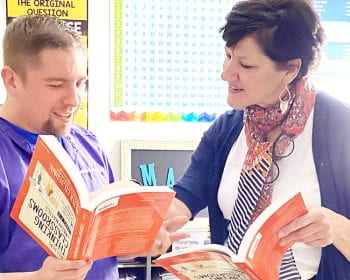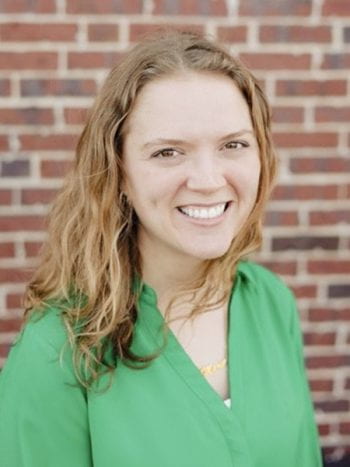It’s fair to say that Bryant Baker’s relationship with math has evolved.
In high school and college, he resisted advanced math classes and found himself turned off by teachers with an old school mentality. In short, he didn’t like math. Today, he’s teaching it (along with science) to sixth graders at Bernard Middle School and delighted to help students navigate their own paths to and through a subject that’s gotten a bad rap.
“A lot of students have this predetermined notion that math is scary and that they’re not good at it,” says Baker. “I take it upon myself to build that confidence back up. At the beginning of each school year, I tell them, ‘My goal is to change your mind about math just a little bit. I want you to like it just a little bit more.’”

Baker’s secret sauce is pretty simple: build relationships with students and
find out where math could matter to them.
“I look for those points of entry,” he says. “I had a kid tell me he doesn’t like math, but he wants to be a painter. I can work with that. How much paint would he need to buy to paint a house? To confidently know that, he needs to know how to calculate the surface area of the house.”
Baker believes that teachers can achieve more when they bend, flex and adapt. He is refining his skills in doing just that with support from Wendy LaRose, an instructional specialist at the Institute for School Partnership at Washington University in St. Louis. LaRose brings years of classroom experience and professional development prowess, serving as a Math314 coach to Baker and teachers from three other middle schools in the Mehlville School District.
Put Me In, Coach
No two ISP coaching cycles are exactly alike, because they are about discovery, but they do follow a framework that includes group professional development, regular 1:1 check-ins, lesson observations, modeling and reflection driven primarily by individualized teacher self-identified growth. For the exploration to be most authentic and effective, says LaRose, a foundation of trust has to be established.
“Once those relationships are built, it’s easier to be a critical friend and sounding board,” says LaRose. “Every teacher strives to be a lifelong learner striving to become better. As a coach, I want to raise questions that cause teachers to reflect and imagine the possibility that things could be done differently. I’m inviting the teacher to consider all the different ways kids may enter into a math task. My primary role is to explore and plan with a teacher how every student can participate fully in the math classroom and how they can learn from each other.”
The collaborative, hands-on nature of ISP-style coaching is grounded in research confirming that mere observation followed by written feedback isn’t effective. What does work is an ongoing relationship punctuated with multiple classroom visits, in-the-moment problem-solving and meaningful follow-up that elevates a coach from an occasional drop-in guest to a trusted thought partner there for the long haul.
“People coming in and out of my classroom is business as usual,” says Baker. “For some teachers, that can be anxiety-inducing, but there’s this misconception that we’re trying to put on a show for them. Sometimes teachers think they need to be sharing the best lesson of their lives, but that’s NOT what you want to do. If you’re going to have a valid, valuable coaching experience, you don’t want to show your best card! I want my coach to see who I am, so I can grow.”
Welcoming support from a trusted partner
“Just take the door off the hinges,” Fassett says. “Whether you are a child, or an adult, if you come into my room, we’re doing math.”
Like Bryant, seventh grade math teacher Maria Fassett also has no qualms about being observed in her Hoech Middle School classroom.
“Just take the door off the hinges,” Fassett says. “Whether you are a child, or an adult, if you come into my room, we’re doing math.”
Among her welcome guests is ISP/Math314 instructional specialist and coach, Jing Qiu, who’s proven essential to Fassett’s newfound understanding of high-level math tasks as she onboards with the Ritenour School District. The District collaborates with ISP’s Math314 program, as well as STEM District Immersion (DI), an ambitious research-practice partnership involving two other area school districts that have prioritized equitable math instruction: Mehlville and Maplewood Richmond Heights

A newcomer to Ritenour, but not teaching (she was honored with an Elementary Teacher of the Year Award by the St. Louis Public Schools), Fassett entered the coaching opportunity with low expectations. She’s been pleasantly surprised with what ISP brings to the table.
“They are serious!” notes Fassett. “They actually want to help me. I’ve never been with a group so involved with making me a better teacher, helping me get resources and just advocating not only for me, but for the students and what they need.”
That’s good news for Qiu, who takes her coaching role very seriously.
“Coaches have a responsibility to create an environment that encourages teachers to have a growth mindset, to be coachable,” Qiu says. “Nobody can learn from me unless I have first communicated that I believe in them. Shifting mindset can be uncomfortable, and being uncomfortable is how we learn and grow.”
Jing, LaRose and other ISP coaches bring with them to each interaction any number of questions: What went well? What can we do differently? What are the common themes that we want to address? What do you need?
“A lot of that thinking can still be preplanned. We can predict common mistakes and plan our responses ahead of time. It’s like having a set of tools in your instructional toolbelt.”
“We help teachers explore how to introduce mathematical tasks that invite everyone into thinking and valuing diverse ways of tackling a problem,” says ISP Executive Director Victoria May. “How can we coach the teacher to ask the right question to each student group? How can they know how to sequence when each group shares their learnings? When do you decide that it’s time to switch from a small group to whole group instruction? It takes a lot of skill to be able to differentiate within a mixed group classroom. Coaching for equity is in those small decisions that teachers make every day.”
Qiu concedes that teaching through high-level tasks is challenging, making the need for immersive coaching all the more valuable.

“It’s essential to strike a balance,” says Qiu. “When shifting from a lecture style that many teachers use to build procedural fluency to more of a facilitator role that helps students develop conceptual understanding, the more in-the-moment decisions have to be made. A lot of that thinking can still be preplanned. We can predict common mistakes and plan our responses ahead of time. It’s like having a set of tools in your instructional toolbelt.”
For Fassett, one of those tools is putting herself back in the learning headspace as a student who struggled with math until the light bulb went off in college calculus.
“I think going through life as a student who didn’t understand math has helped me be a better teacher. I can detect when a student hits a rough spot. I see the pencil stop…and can step in. I’m a big person for doing the calculations myself as if I’m the student before each lesson.”
Her district colleague Camille Morgan teaches seventh grade at Ritenour Middle School, also works with Jing Qiu as a coach and participates in STEM DI. She’s come to welcome those aha moments that reveal themselves in the classroom.
“I let kids tell me what they are thinking, and have epiphanies myself,” says Morgan. “I live for those moments now! They (students) come in with an opinion of what they can and cannot do. I tell them, ‘You can do it all! Did you know that you are doing algebra? You are 12 years old and you’re doing 10th grade math! It’s amazing how you can get high-level thinking out of them, without them even knowing it.”
Read more about ISP Coaching:
Extending an early invitation to math confidence with coaching and partnership
Using video as a reflective tool, Brittany Woods Middle School teachers see new goals for themselves
